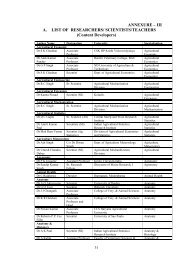You also want an ePaper? Increase the reach of your titles
YUMPU automatically turns print PDFs into web optimized ePapers that Google loves.
(i) Expectant ewes should be separated from general flock at least 3 weeks prior to expected<br />
date of lambing and given extra feeding as per schedule.<br />
(ii) The expectant ewe immediately prior to lambing should be removed to individual lambing<br />
pen 4' x 3' with small feeding and watering trough and is properly bedded and protected<br />
from direct wind.<br />
(iii) The lambs and mother should stay for 24-28 hours in the individual pen.<br />
(iv) The milk yield and mothering ability of ewe should be determined by examining udder<br />
and from the interest shown by ewe in her lamb and in case of poor milk yield/poor<br />
mothering ability, the lambs should be given supplementary milk feeding as per schedule.<br />
(v) The lambs should be identified by ear tagging and tattooing and weighed within 12 hours<br />
of birth when dry. The weighment will be done close to 25 g. The naval cord should be<br />
severed, if not done automatically and painted with tincture iodine. The ewe should also<br />
be weighed at the time the lamb is weighed and care should be taken that placenta has<br />
been expelled before weight is recorded. In case of retention of placenta the medicines as<br />
recommended by Veterinarian should be administered.<br />
(vi) Care may be given to ewes showing difficulty in parturition and the lamb, may be helped<br />
to stand for suckling in case necessary. Similarly help in cleaning the eyes and nostrils of<br />
lambs, in case mother is exhausted and is not taking care, may be rendered.<br />
(vii) The ewes upto one month from lambing date would be kept separately in a group of 75-<br />
100 and grazed close to the corrals so that they can be brought during noon for suckling<br />
their lambs.<br />
(viii) The lactating ewes should be given supplementary feeding as per schedule.<br />
(ix) The young lambs upto one month should stay in the corrals and after 15 days of birth<br />
should be given some grain and green leafy feed (creep feeding). They should go out for<br />
grazing separately from their mothers after one month of age. The supplementary feeding<br />
of young lambs should be done as per schedule. The lambs should stay with their mothers<br />
only at night.<br />
(x) Weaning should be done at 90 days of age and both mother and lambs should be weighed<br />
on the day of weaning.<br />
(xi) It is usually seen that maconium does not pass in some lambs especially where mothers do<br />
not have good milk yield. In such cases about 5-10 cc of liquid paraffin may be<br />
administered per rectum or about 1/2 ounce of it may be given per mouth.<br />
(xii) Keep a vigilant eye for dystokia or difficult birth due to malpresentation or other causes.<br />
(xiii) Maiden ewes in poor condition or small framed ewes lambing to big rams will generally<br />
be finding difficulty on parturition.<br />
(xiv) Seek prompt veterinary aid and advice from an experienced shepherd/stockman .<br />
(xv) Newborn lambs, after being licked by the mother, generally stand on their legs and start<br />
seeking for teats and suckle milk.<br />
(xvi) If they are not able to do so after sufficient time, provide help to them in suckling first<br />
milk.<br />
(xvii) Colostrum (first milk) is very essential for health and survival of lambs.<br />
(xviii) Save newborn lambs from cold, rain and winds.<br />
(xix) Care for disowned or orphan lambs by resorting artificial milk<br />
feeding or arranging foster mothers.<br />
(xx) Ligate, sever and antiseptically dress the naval chord ofthe lamb.<br />
(xxi) Giw a tea-spoon full of castor oil/liquid paraffin to the lamb to facilitate defecation and<br />
passing out of meconium easily.<br />
(xxii) Don't handle lambs too frequently and let the ewes lick and recognise them properly.<br />
(xxiii) Allow newborn lambs to remain with their mothers for a week or so.<br />
(xxiv) Feed sufficient quantity of good quality hay and concentrates (if possible ) to the<br />
lactating ewes for the increase in let down of milk.<br />
(xxv) Provide plenty of clean fresh drinking water as the lactating ewes drink a surprising<br />
amount of water during lactation.<br />
449




